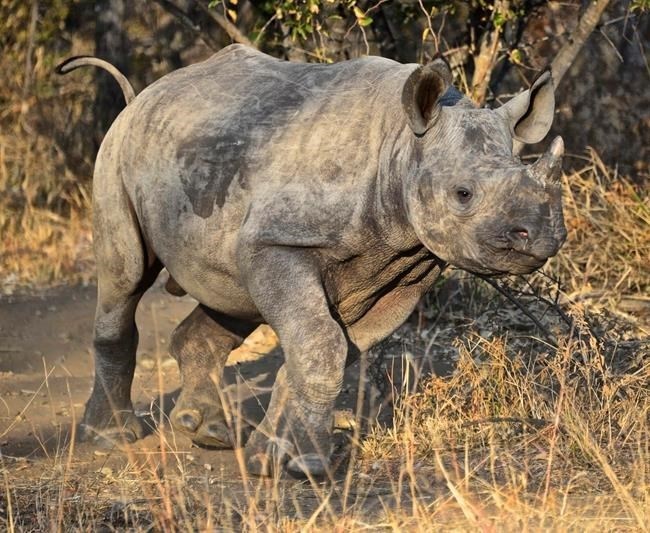
In this photo taken June 28, 2014 and supplied by a board director of The Rhino Orphanage, a baby rhino runs in the bush at the facility, which is near a lodge at the Entabeni Safari Conservancy, in the northern part of South Africa. Poachers who kill rhinos for their horn sometimes leave rhino orphans that struggle to fend for themselves in the wild.
Image Credit: Dex Kotze/The Rhino Orphanage via AP
July 19, 2015 - 6:00 AM
ENTABENI SAFARI CONSERVANCY, South Africa - They are the most vulnerable victims of South Africa's rhino poaching scourge, the baby rhinos that survive the shooting deaths of their mothers.
Many probably die of dehydration or other perils in the wild, but some lucky ones end up at The Rhino Orphanage, where workers become mothers to the traumatized young ones, feeding, walking and comforting them until they are ready to return to the bush. They learn to recognize voices, sleep in a stable, feed on a milk substitute, roll in the mud and play with each other and their human minders, who try not to get knocked over by these big, rambunctious babies.
The orphanage takes extreme measures to protect its rhinos from poachers, barring all but selected visitors and not advertising its exact location. Managers say only that it is near a golf and safari resort at the Entabeni wildlife park in Limpopo province, about a three-hour drive north of Johannesburg.
"These rhinos would be dead if there weren't a place to send them," Gabriela Benavides, a Mexican veterinarian at the orphanage, told The Associated Press.
Benavides spoke at an enclosure where three rhinos named Faith, Lunga and Matthew, all less than one year old, lounged, trotted and slurped water from containers. The rhinos approached visitors behind a low wooden barrier, allowing themselves to be touched and stroked on the rough skin of their heads.
South Africa, home to most of the world's rhinos, has been under heavy pressure from poachers who killed more than 1,200 of the country's rhinos in 2014 and are killing them at a high rate this year to meet rising demand for their horns in parts of Asia. Consumers believe rhino horn, which is ground into powder, has medicinal benefits, but there is no scientific evidence to support that. The horn is made of keratin, a protein also found in human fingernails.
South Africa's national parks service rescued 16 rhino orphans in 2014; a dozen were put in specialist care and four were placed with surrogate mothers in state-run enclosures, Edna Molewa, minister of environmental affairs, said in May.
"The ultimate aim is for the orphans to be integrated back into a normally functioning breeding population," Molewa said.
The mothers of most rhinos at the orphanage were shot, though one young rhino's mother died in a fight with another rhino. Poachers with machetes hacked another baby rhino more than two-dozen times as it stayed near the body of its mother, but it recovered at the orphanage.
Founded in 2012, The Rhino Orphanage says it has successfully raised and released nine rhinos back into the wild. Because of security concerns, the staff do not say how many rhinos are at the facility, which has no identifying signs at the entrance.
Poachers will "go for any little bit" of horn, even from a baby rhino whose horns are emerging, said Dex Kotze, a board director of the non-profit orphanage. He said it can cost roughly $32,000 a month to maintain the orphanage, and that several similar centres have started operating elsewhere in South Africa.
On one occasion, poachers were on their way to the orphanage but their gang had been infiltrated by an undercover agent from South African intelligence and the suspects were arrested, according to Benavides, the vet.
International interns who have assisted with the rhinos turned off phone and camera location settings and did not post photographs or video onto social media websites while at the orphanage for fear of giving away its whereabouts, said Fortunate Phaka, project leader of the group called Youth 4 African Wildlife.
"We try to keep it as secret as possible while at the same time raising awareness," Phaka said. "It's kind of hard trying to raise money for something people are not allowed to see."
Limited human contact with the rhinos also assists in their return to the wild, which happens when they are two or three years old, the age at which they would usually become independent.
Benavides said it was rewarding to rehabilitate rhino orphans, but also stressful because, "you don't know what's going to happen to them when you finally let them go."
News from © The Associated Press, 2015